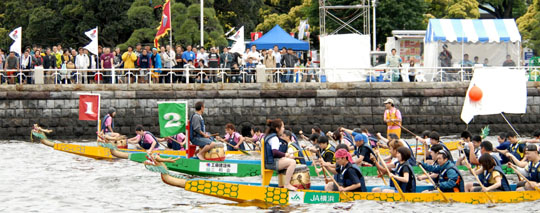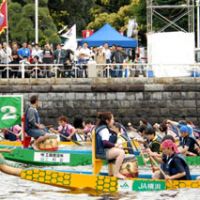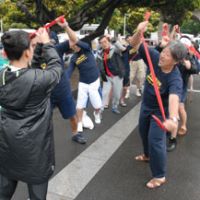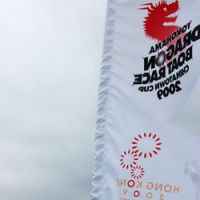At 8:15 on a drizzly, windy Saturday morning at the end of May, cheerful shouting could be heard coming from Yokohama's seaside Yamashita Park. Even at the early hour, people had already gathered to participate in the 16th Yokohama Dragon Boat Race, spanning four days over two successive weekends.
Dragon boat races are a traditional event in Hong Kong. The long, narrow boats have dragon heads and tails attached to them and make for an exotic and colorful scene.
Racing in Yokohama first began in 1994 with the support of the Hong Kong Economic and Trade Office, according to Katsuhiro Okabe, chairman of The Yokohama International Dragon Boat Association, a nonprofit organization.
The event consists of teams of some 20 paddlers each competing over a 260-meter course running parallel to the shore. Six winners are determined on each of the first three days. On the final day, previously qualified teams compete.
The teams are made up of people from all ages and anyone over 12 can join. There is a ¥70,000 registration fee. "We decided to continue this event simply because it's fun," said Okabe, who has helped organize the races from the beginning.
He said that the Hong Kong Economic and Trade Office initially lent dragon boats shipped from Hong Kong for the first event, but the group later decided to buy their own boats at a cost of ¥1 million each and save the high transport costs. The cost of nine boats, Okabe laments, was high nonetheless.
According to Okabe, after the event caught the attention of Yokohama residents, the number of teams participating grew from 27 in 1994 to a whopping 208 this year.
Heavier rain later in the morning on the first day of the event had dragon boat participant Paul Woodward and his friend May Ishikawa, who came to cheer for her husband, "very worried" that the rain would ruin the race.
"It's a good way to make friends and good way to keep fit. It's a great activity if you're older like me," said Woodward, associate director in a real estate investment company in Tokyo. Woodward was part of the Tsurumigawa-based Powers team and taking part in the race for the first time.
Ishikawa, a teacher in Tokyo's Shinagawa Ward, said she had yet to participate in the race, but had seen a race in India before and boats long enough to hold 100 people. "I may join the race next year," Ishikawa said enthusiastically.
Woodward explained that his team had gotten together for two hours every Saturday for practice sessions. "Later, we go eat Chinese food and drink beer, which is just as important as the paddling," he added.
According to Woodward, his team includes people from age 21 to 80. "It's good for bringing the generations together."
Hong Kong natives residing in Japan say the Yokohama race is an absolute must. "Hong Kongers definitely have to take part. We simply can't miss it," said Misato Uehara, a Hong Konger living in Japan over 20 years and a committee member of the Hong Kong Tai Ping Shan Club.
Tai Ping Shan Club, which translates to Victoria Peak Club, is a community club for Hong Kong natives now living in Japan and Japanese who are interested in Hong Kong.
According to Uehara, the original dragon boat race was held to commemorate the death of Qu Yuan, a scholar in the Warring States Period. The legend goes that villagers beat drums, splashed water and threw rice in the river where he died to drive away evil spirits.
Many Hong Kong citizens watch the Hong Kong dragon boat races on TV while eating zongzi (chimaki in Japanese), glutinous rice stuffed with different fillings during the event in the Tung Ng Festival, explained Uehara.
Norris Fung, the Tai Ping Shan chairman, said that in Hong Kong, only people in large associations or companies can participate in the event, so the Yokohama race was a great opportunity for him and other members to enjoy something he couldn't be a part of in Hong Kong.
"It's fun also because I get to speak Cantonese with the Hong Kong members," said Fung.
Banker Alan Lee, who has joined the dragon boat race more than 14 times in Hong Kong and Japan, agreed and said, "I missed the members. I hadn't seen them for a while." The Hong Kong team consists of 22 members, half Japanese and half from Hong Kong.
While some teams practiced hard and long for the race, the Tai Ping Shan members claimed they were unable to practice at all due to work demands.
"Over the past 10 years, our boat has never sunk. We never won a prize either, though," she said laughing.
Unfortunately, the Powers team beat the Hong Kong team in the first round because the Hong Kong paddlers were unable to maneuver their boat and headed for the open sea. On the second round, however, they were able to stay on course and make the finish line.
"We just wanted to stay in the sea longer," Fung joked about the first round.
Uehara claims that winning is not the most important thing to the team. Just taking part is. "Since childhood, I've known the historical background of this event. I hope the organizers will continue holding the race."
For further information contact the Yokohama International Dragon Boat Association at (045) 261-1163 or e-mail the group at [email protected] or see the Web site at www.yokohama-dragon.com








